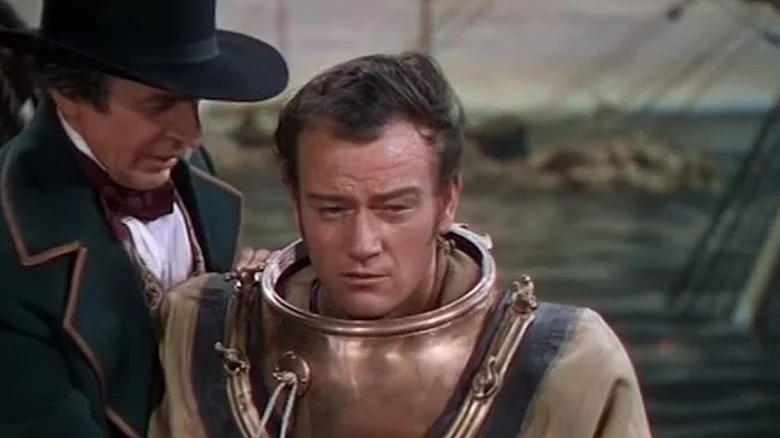There are few pettier on this Earth than an actor who chased a coveted role and received little to no consideration from the director. Sure, some have thicker skin than others and can handle rejection with little bruising to their ego. And then there are guys like John Wayne, who didn’t like losing anything. Ever.
The Duke had slugged it out in poverty row Westerns throughout the 1930s before landing his breakout role in John Ford’s 1939 triumph, “Stagecoach.” After the success of that film, Wayne had zero interest in groveling for a part ever again. But he made an exception for Cecil B. DeMille, the master of the Hollywood epic who, in early 1940, was casting “North West Mounted Police.” Despite the yawner of a title, this was a big-deal motion picture — Gary Cooper was set to star as a Texas Ranger who joins forces with Canadian lawmen to track down a fugitive outlaw. Wayne learned that the supporting part of Scottish scout Tod McDuff was still in play, and believed that appearing in a DeMille movie would boost his rising profile.
Wayne booked an appointment with DeMille at the director’s Paramount office, and, according to Maurice Zolotow’s “Shooting Star: A Biography of John Wayne,” got completely brushed off. DeMille blew past the actor, who followed him onto the street outside. The filmmaker knew Wayne from the 1930 Western, “The Big Trail,” but after being told the Duke had spent the last decade making Westerns at Republic, a B-Studio at best, he told the newly minted star, “Well, you’ll hear from us if we have something.” Wayne never heard from DeMille until he was casting “Reap the Wild Wind” two years later. Suddenly, DeMille wanted Wayne. The Duke knew this, and was resolved to make the director squirm.
Cecile B. DeMille on the ropes

When Republic Pictures honcho Herbert J. Yates learned Cecile B. DeMille wanted to screen John Wayne’s latest Western, “Dark Command,” he was over the moon. Though the director was looking at the Duke for the second male lead (behind Ray Milland), a DeMille movie conferred prestige on everyone involved. Discerning moviegoers disinclined to see a random oater might reconsider if they associated the star with a DeMille production.
Wayne didn’t care. Maurice Zolotow recounts the Duke’s response in “Shooting Star: A Biography of John Wayne”:
“‘No, Herb.’ Wayne said, to Yates’ surprise, ‘I don’t want you to send him a print. You just tell him if he wants to see ‘Dark Command,’ you’ll set up a screening for him on the Republic lot. Yeah — that’s what I said. Otherwise, let him just wait until it’s released and see it with the common people.'”
DeMille played along, saw the film at Republic, and loved what he saw. He offered Wayne the role of salvager Captain Jack Stewart in “Reap the Wild Wind.” The Duke, savoring the opportunity to screw with one of the most revered directors in Hollywood, didn’t refuse the part outright. Instead, he sent DeMille 17 pages of script notes designed to pump up his part. “I figured that would just about wash it up,” said Wayne.
Shockingly, DeMille persisted.
Wayne reaps the wild wind on his own terms

John Wayne was surprised when the filmmaker flattered him in the hopes of convincing him to take the role. “He said he needed me,” recalled Wayne. “Well, I have to admit it kind of won me over.”
The Duke was still leaning toward a no, but he opted to take his newfound influence out for a spin and tried to get a concession or two out of Cecile B. DeMille. Wayne was concerned about making “Reap the Wild Wind” at Paramount, which had Ray Milland under contract. He needed to know that DeMille would have his back if the studio tried to cut down Wayne’s role. DeMille capitulated, as Maurice Zolotow recounts in his book:
“I want you for this film, John,” [DeMille] said. “I want you very much. I give you my word of honor that I will do you justice. You know that I was fair to Preston Foster in ‘North West Mounted Police’ even though Gary Cooper is a Paramount star.”
Wayne then targeted DeMille’s reputation for “bawlin’ out” actors, and let the filmmaker know he wouldn’t stand for such treatment. “John, I never bawl anybody out that does not deserve to be bawled out,” said the director. “I am fair.”
Wayne took the gig and wound up with another box office hit. While “Reap the Wild Wind” plays as a creaky melodrama nowadays, the DeMille association paid off at the time. With Wayne’s big-screen mentor John Ford serving overseas with the United States’ Office of Strategic Services during World War II, the star had to be more open and trusting with his collaborators. Though the movies weren’t that great until Ford returned in 1945 with “They Were Expendable,” this was the period where Wayne solidified his stardom.
